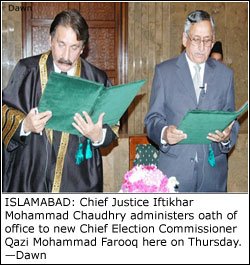
PROFILE OF NEW CHIEF ELECTION COMMISSIONER PAKISTAN
Justice [retd] Qazi Mohammed Farooq
By Sherry Rahman
Before assuming his new post as CEC on March 16 2006, Justice (retd)Qazi Mohammed Farooq had served as the Peshawar High Court's Chief Justice and a Judge on the Supreme Court.
Farooq was appointed the high court's chief justice on May 12, 1999 and retired from the post on January 5, 2000. He was appointed a judge of the Supreme Court on January 4, 2000, a crucial period when some of the judges, including the Chief Justice of Pakistan Justice Saeeduz Zaman Siddiqui, declined to take a fresh oath under the Provisional Constitution Order (PCO).The Chief Justice was removed and replaced by Justice Irshad Hasan Khan and a new line-up of judges, including
Farooq, took their oath of office under the PCO. Farooq's supporters defended that step on the grounds that he had retired from the high court and was no longer under oath to defend the constitution. Therefore, there was no moral hindrance for him to take an oath under the PCO.
Those who consider Farooq to be an upright judge point to some important judgements that he delivered when he was the Chief Justice of Peshawar High Court. In 1997, he disqualified two senators of the PMLN government ruling that Anwar Kamal Marwat and Iqbal Zafar Jhagra, who had been elected on technocrat seats from the Frontier province, did not meet the definition of technocrats.
However, his critics point out that during his stint as a judge of the Supreme Court he co-authored some of the most controversial judgements. He was a member of the 12-member bench which validated the emergency proclaimed by General Pervaiz Musharraf on the basis of the Doctrine of State Necessity on May 12, 2000. On April 10,2002, Farooq was part of a five-member bench which dismissed a
petition of the SCBA that had challenged a notification regarding the elevation of three judges of the Lahore High Court while superseding senior judges, including the high court's chief justice. The judgement had resulted in a bitter now between the SCBA and the judiciary as the former refused to argue a review petition expressing no confidence in the court.
Moreover, Farooq was also a member of the bench which had dismissed the constitutional petitions of Qazi Hussain Ahmad, among others, on April 27, 2002 and had thereby validated Chief Executive Order No 12 of 2002 regarding the holding of a presidential referendum on April 30 that year. Two other important cases in which Farooq was on the bench were the petitions challenging the Legal Framework Order
(LFO) and the condition of graduation introduced for the candidates contesting the 2002 general elections. Both petitions were dismissed.
Towards the end of his career as a Supreme Court judge,Farooq became the centre of a controversy over the extension of three years in the retirement age of the judges of the superior court through the LFO. Farooq, along with then Chief Justice Shaikh Riaz Ahmad and Justice Munir A. Shaikh, had availed that extension despite a request made by the SCBA to turn it down. Finally, the seventeenth
Constitutional Amendment restored the previous law stipulating 65 years as the age of retirement for the judges and Justice Farooq, along with nine other judges, had to relinquish his post.
No comments:
Post a Comment